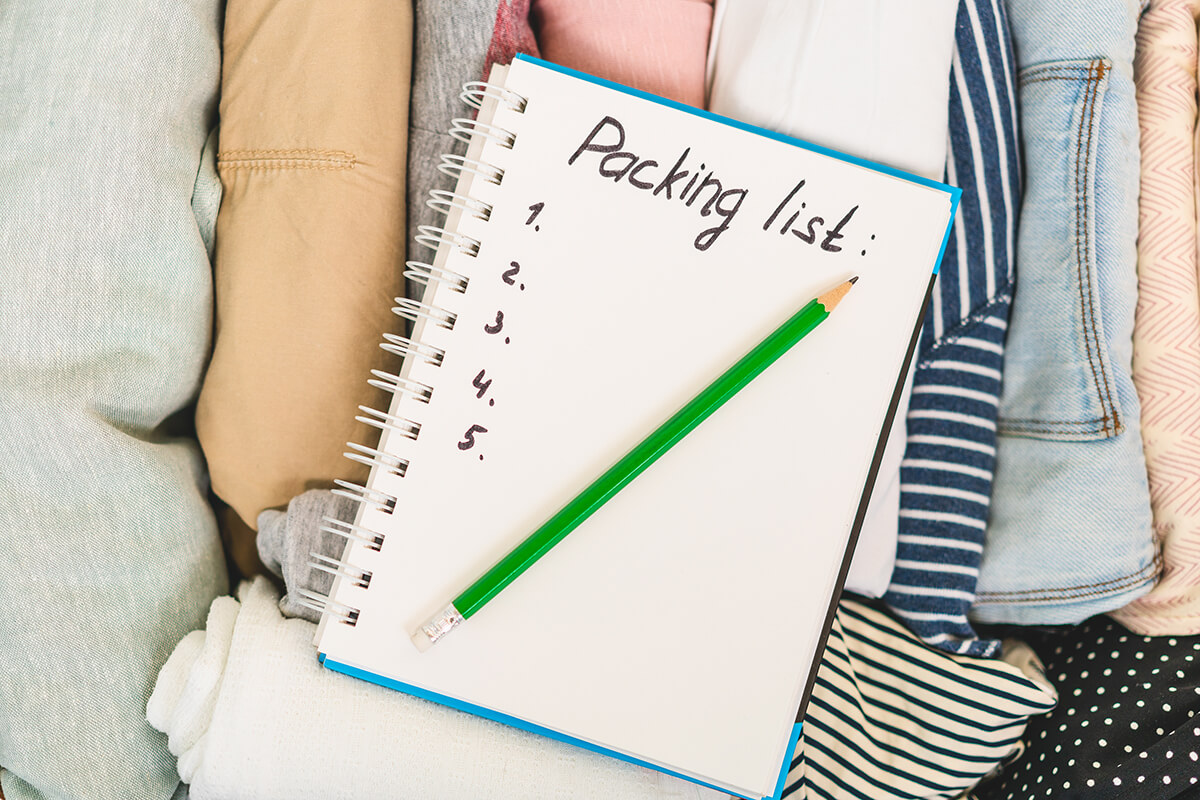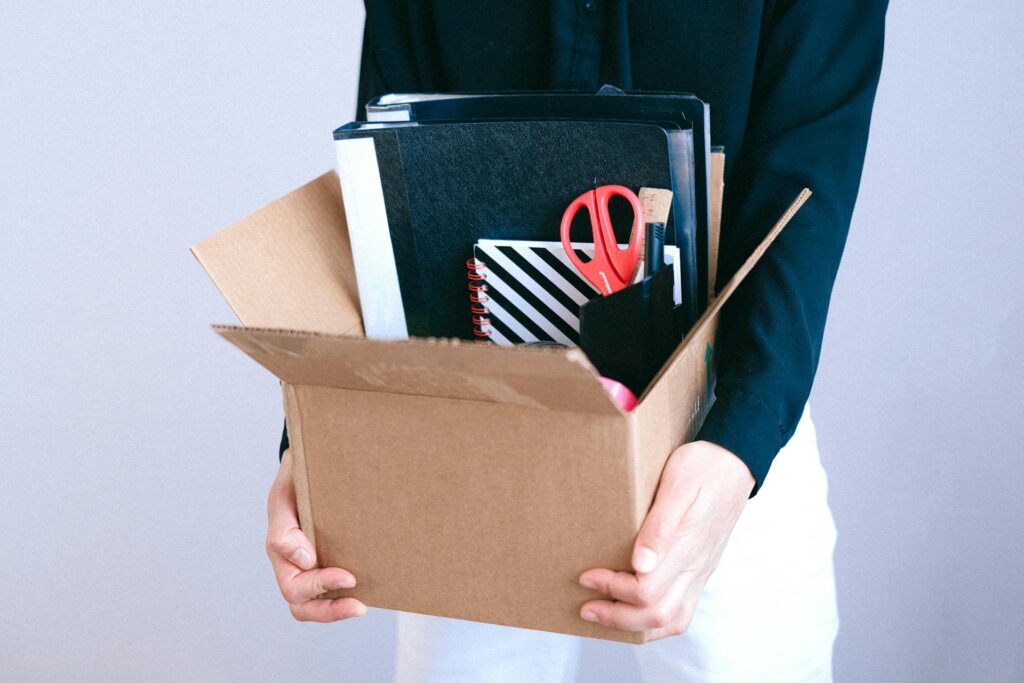Amidst the flurry of tasks, paperwork, and emotions, when relocating abroad, it is easy to overlook essential items that can significantly impact your transition to a new country. We created a list of the most commonly forgotten things to pack to help you avoid unnecessary stress and ensure a smoother relocation process. So, let’s take a look at crucial elements that should be on your packing list!


Why Should You Make a List of the Most Commonly Forgotten Things to Pack
Making a relocation checklist of things not to forget when packing is crucial for several reasons. First, it ensures that you have all the necessary items to facilitate a smooth relocation to another country without any unnecessary relocation stress. By identifying and addressing potential oversights, you reduce the likelihood of facing unexpected challenges or delays upon arrival.
Second, having a comprehensive list can save you time, effort, and money. If you forget to box up essential items, you may need to spend additional resources to replace or ship them to your new location. By being organized and prepared, you can avoid such inconveniences and allocate your resources to more pressing aspects of your relocation process.
Lastly, this type of list can help you maintain your peace of mind throughout your relocation to a new city abroad. Relocating to a new country can be overwhelming, and having a well-prepared list serves as a roadmap to ensure that you have covered all bases. This sense of preparedness can significantly alleviate anxiety and allow you to focus on embracing the exciting opportunities and relocation benefits that lie ahead in your international journey.
A List Can Help You and Your International Movers
If you plan on getting international moving services from a trustworthy overseas moving company, such as Sunset International Shipping, note that a well-prepared relocation inventory list can benefit both you and your international movers. Here is how:
- Organization – it makes it easier for you and your movers to keep track of your belongings,
- Time-saving – it helps movers be more efficient by providing a clear plan of action,
- Damage prevention – a detailed list can help your movers understand which items require special care or packing materials,
- Customs compliance – with it, movers can easily identify any items that require special documentation, permits, or attention to comply with customs regulations, avoiding delays and potential penalties.
In the end, in the unfortunate event of lost or damaged belongings, a packing list serves as an inventory and proof of your possessions. This can simplify and expedite the process of filing insurance claims and receiving compensation. Now, let’s go over the top seven things people leave behind when relocating abroad.


#1 Documents and Important Papers
What not to forget when packing for international relocation? The first thing to remember to do is prepare your important documents. These documents are crucial for a variety of reasons, including verifying your identity, applying for visas, residence permits, and work permits, as well as accessing essential services such as healthcare, banking, and education in your new country. Here are some of the most important papers you need to bring:
- Identification documents – passport, driver’s license, and national identification cards,
- Travel and immigration documents – visa, residence permit, and work permit,
- Personal records – birth certificates, marriage or divorce certificates, and adoption papers, if applicable,
- Educational and professional documents – diplomas, transcripts, certificates, and letters of reference from previous employers,
- Medical records – vaccination records, prescriptions, and any relevant medical documentation, such as allergy information or ongoing treatment plans,
- Financial documents – bank statements, tax returns, and credit reports to help establish a financial history in your new country,
- Legal documents – the power of attorney, wills, and any other legal documents that may be relevant in your new country,
- Vehicle documents – if you plan on getting overseas vehicle shipping services, make sure to prepare the car title, registration, and insurance information.
How to Organize and Pack Important Documents and Papers?
Organizing documents needed to travel abroad is essential to ensure their safety and easy retrieval. First of all, you need to collect all the important documents and papers you need to bring and then sort the documents into categories – similarly to how we did it above.
It’s also crucial to scan your important documents and save them as digital copies in a secure cloud storage service or on an encrypted USB drive. This will serve as a backup in case your physical documents are lost or damaged and can be accessed from anywhere. You also need to set aside the box with your important papers separately from your other belongings and keep it easily accessible during your journey. You may need to present certain documents at various points, such as during customs checks or when setting up services in your new country.
Your best course of action is to place the protected documents in labeled folders or binders, maintaining the categories you created earlier. If you’re not certain how to organize a document binder, take a look at the video below:
#2 Medications and Medical Supplies
Access to familiar medications and supplies may be limited or unavailable once you start living overseas. Having a sufficient supply on hand ensures that you can continue your treatment without disruption. Bring a sufficient supply of all prescription medications you currently take, along with copies of the prescriptions themselves.
Additionally, box up a supply of common over-the-counter medications, such as pain relievers, allergy medications, and cold remedies. It’s also a good idea to assemble a basic first aid kit with items like antiseptic wipes, gauze, adhesive bandages, medical tape, tweezers, and scissors to address minor injuries and ailments. Depending on your specific needs, you may need to also bring items such as diabetic supplies, asthma inhalers, or EpiPens.
What to Consider When Packaging Medical Supplies?
Since you’ll be organizing an international relocation, you need to check the regulations and restrictions for bringing medications and medical supplies into your destination country. Some countries may have strict rules regarding the import of certain medications or require specific documentation. At the same time, note that you need to keep medications in their original packaging with clear labels and instructions. This will help avoid confusion or suspicion during customs inspections.


#3 Power Adapters and Converters
Bringing power adapters and converters when moving overseas is essential for ensuring your electronic devices function properly in your new country. Different countries have varying voltage standards and outlet types, which means that without the appropriate adapters and converters, you may not be able to charge or use your devices.
It’s advisable to determine the specific power adapter types and voltage requirements when preparing to relocate to another country. This will give you enough time to purchase the necessary equipment. Focus on obtaining adapters and converters for your most important devices, such as your phone, laptop, and any medical equipment. In the end, make sure to clearly label your adapters and converters with their type and the devices they correspond to, making it easier to identify the correct equipment when setting up your electronics.
#4 Personal Hygiene and Toiletries
Having a supply of your preferred items on hand ensures that you can maintain your daily hygiene routine without disruptions or having to search for suitable alternatives. Belongings you need to remember to box up include:
- Oral care items – toothbrush, toothpaste, dental floss, mouthwash,
- Hair care products – shampoo, conditioner, hairbrush, comb, and styling products,
- Body care products – soap, body wash, body lotion, and deodorant,
- Grooming tools – razor, shaving cream, nail clippers, tweezers, and scissors.
- Specialized products – any other specific items you require.
It’s a good idea to transfer your toiletries into travel-sized containers to save space and comply with airport security regulations and label each container with its contents. Make sure to keep a small bag of essential toiletries, such as toothpaste, toothbrush, or shampoo, in your carry-on luggage for easy access during your journey.
Additionally, prepare enough of your preferred products to last at least a few days, giving you time to locate suitable replacements or adapt to local alternatives in your new country.


#5 Sentimental and Irreplaceable Items
Sentimental objects often hold significant emotional value and cannot be replaced if lost or damaged. Including them in your move ensures that you can continue to treasure these mementos and create a sense of familiarity and comfort in your new home.
Types of Sentimental and Irreplaceable Items to Bring
Depending on your individual situation, you can decide to bring:
- Family heirlooms – jewelry, antiques, and other items passed down through generations,
- Photographs – physical photo albums, framed pictures, or digital collections of your cherished memories,
- Artwork – original paintings, sculptures, or other unique pieces created by you or loved ones,
- Keepsakes – special gifts, souvenirs, or mementos from important events or milestones in your life,
- Awards and achievements – trophies, certificates, or other tokens of recognition for personal or professional accomplishments,
- Collectibles – rare or valuable items from a personal collection, such as stamps, coins, or figurines.
Be aware that space and weight limitations may restrict the number of sentimental items you can bring. Select the most meaningful and irreplaceable items that you cannot imagine living without. You should also consider getting packing services for the most treasured objects to ensure their safety during transit.
#6 Kitchen Appliances and Cooking Supplies
Having access to your preferred cooking tools, appliances, and equipment can make it easier to prepare your favorite meals and adapt to the culinary landscape of your new country. Additionally, certain specialty items may be difficult to find or more expensive to purchase in your new destination.
However, you should be mindful of space and weight limitations when deciding what to bring – there may be a lot of kitchen items you need to get rid of. At the same time, ensure all kitchen and cooking supplies you decide to pack when relocating overseas are clean and dry before you start boxing them up to prevent damage, mold, or odors.
Tips for Packing Kitchen and Cooking Supplies
If you decide to pack glasses and other fragile items, you should use bubble wrap, packing paper, or soft cloth to protect them from damage. Fill any empty spaces in boxes with packing materials to prevent items from shifting during transit. You can also maximize space and minimize damage by stacking or nesting items, such as pots and pans or mixing bowls when packing. Place heavier items at the bottom of boxes and lighter ones on top.
Clearly label the boxes containing your kitchen and cooking supplies, indicating their contents and fragility. This will help ensure they are handled with care by your overseas shipping company and also make unpacking easier.


#7 Outdoor Gear and Clothing
Appropriate gear and clothing ensure that you can continue to enjoy your hobbies and explore your new surroundings safely and comfortably. Therefore, it’s important to pack clothes suited to the weather conditions of your new country, such as rain jackets, winter coats (if you’re relocating to a cold climate), or warm-weather attire.
You should also bring durable and comfortable shoes or boots designed for specific activities, such as hiking, running, or water sports, as well as gear for your favorite outdoor activities, such as camping equipment, bicycles, or skiing equipment. When it’s time to box them up, break down larger equipment, such as bicycles or tents, into smaller components for easier packing and transportation.


Make a List, and There Won’t Be an Item Left Behind
Amidst the excitement and anticipation that comes with living in another country, it’s easy to overlook certain items when preparing for the move, whether they are a part of our daily routines or simply essential for our comfort, health, and happiness in a new location. By making a comprehensive list of items you should box up, but are most commonly forgotten, you can make the process more manageable and less stressful. And of course, when the time for packing and shipping overseas comes, make sure to have only the best international moving company by your side – contact us and book your move today.
FAQ
It is important to bring important documents and papers when moving abroad because they are required to verify your identity, apply for visas or permits, and access essential services in your new country.
When moving internationally, you should bring papers such as your passport, visa, birth certificate, marriage or divorce certificates, driver’s license, medical records, academic records, work references, and any other documents that may be needed for your specific circumstances, such as custody agreements or professional certifications.
Typically, you can bring medications and medical supplies, but you should check the regulations and restrictions of the destination country. Be sure to box up a sufficient supply, carry prescriptions, and bring any necessary medical documentation to avoid complications upon arrival.
Bring relocation essentials such as toothpaste, shampoo, soap, and deodorant. Consider packing travel-sized versions or buying them upon arrival, and be mindful of any country-specific regulations on product ingredients or quantities.
Sentimental items you want to keep when relocating abroad may include family heirlooms, photo albums, special keepsakes, or children’s artwork. These items can provide comfort and a sense of continuity after relocation to a new home overseas.
You can bring your own kitchen and cooking supplies, but consider factors like available space, differing voltages, and local availability of kitchen items. When it comes to cooking ingredients, it’s best to leave behind anything that could potentially spoil or spill in transit.
Yes, if you plan to engage in outdoor activities or if the climate requires it. Research the climate and customs of your destination to determine the appropriate clothing and gear to bring.
It is essential to do so, as different countries have varying voltage standards and outlet types. Research your destination country’s electrical system to determine the correct adapters and converters needed for your electronics.
Create a thorough packing list and divide it into categories such as documents, clothing, electronics, and household items. Check off items as you pack them, and review the list before departing.
Assess the urgency and necessity of the objects you forgot to bring. If it is crucial, contact friends, family, or colleagues in your home country to help arrange for the item to be shipped to you. If the item can be replaced locally, prioritize purchasing a replacement as soon as possible.








